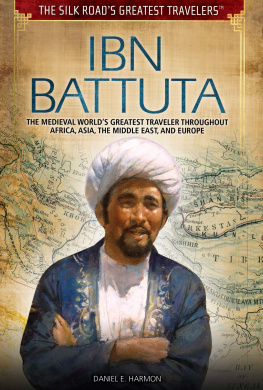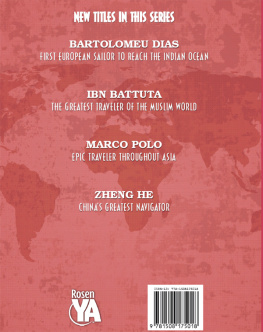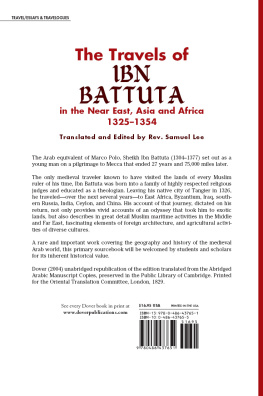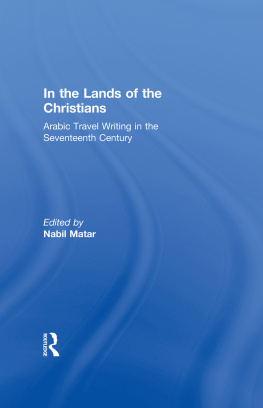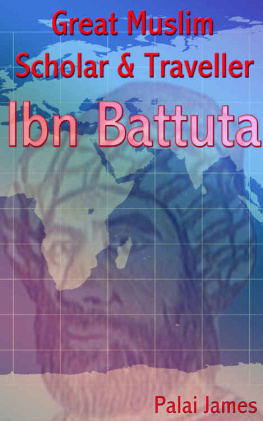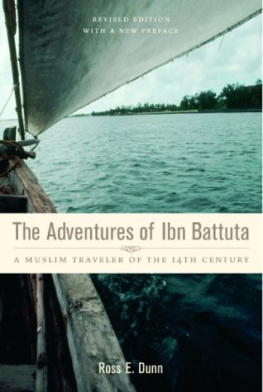TRAVELS IN ASIA AND AFRICA
THE BROADWAY TRAVELLERS
THE BROADWAY TRAVELLERS
In 26 Volumes
| I | An Account of Tibet | Desider |
| II | Akbar and the Jesuits | du Jarrk |
| III | Commentaries of Ruy Freyre de Andrada | de Andrada |
| IV | The Diary of Henry Teonge | Teonge |
| V | The Discovery and Conquest of Mexico | del Castillo |
| VI | Don Juan of Persia | Juan |
| VII | Embassy to Tamerlane | Clavijo |
| VIII | The English-American | Gage |
| IX | The First Englishmen in India | Locke |
| X | Five Letters | Corts |
| XI | Jahangir and the Jesuits | Guerreiro |
| XII | Jewish Travellers | Adler |
| XIII | Memoirs of an Eighteenth Century Footman | Macdonald |
| XIV | Memorable Description of the East Indian Voyage | Bontekoe |
| XV | Nova Francia | Lescarbot |
| XVI | Sir Anthony Sherley and His Persian Adventure | Sherley |
| XVII | Travels and Adventures | Tafur |
| XVIII | Travels in Asia and Africa | Battta |
| XIX | Travels in India, Ceylon and Borneo | Hall |
| XX | Travels in Persia | Herbert |
| XXI | Travels in Tartary, Thibet and China Vol. I | Hue and Gabet |
| XXII | Travels in Tartary, Thibet and China Vol. II | Hue and Gabet |
| XXIII | Travels into Spain | DAulnoy |
| XXIV | The Travels of an Alchemist | Li |
| XXV | The Travels of Marco Polo | Benedetto |
| XXVI | The True History of His Captivity | Staden |
TRAVELS IN ASIA AND AFRICA
13251354
IBN BATTTA
First published 1929 by RoutledgeCurzon
Published 2013 by Routledge
2 Park Square, Milton Park, Abingdon, Oxon 0X14 4RN
711 Third Avenue, New York, NY 10017, USA
Routledge is an imprint of the Taylor & Francis Group, an informa business
All rights reserved. No part of this book may be reprinted or reproduced or utilized in any form or by any electronic, mechanical, or other means, now known or hereafter invented, including photocopying and recording, or in any information storage or retrieval system, without permission in writing from the publishers.
The publishers have made every effort to contact authors/copyright holders of the works reprinted in The Broadway Travellers. This has not been possible in every case, however, and we would welcome correspondence from those individuals/companies we have been unable to trace.
These reprints are taken from original copies of each book. In many cases the condition of these originals is not perfect. The publisher has gone to great lengths to ensure the quality of these reprints, but wishes to point out that certain characteristics of the original copies will, of necessity, be apparent in reprints thereof.
British Library Cataloguing in Publication Data
A CIP catalogue record for this book is available from the British Library
Travels in Asia and Africa
ISBN 978-0-415-34473-9 (hbk)
The Broadway Travellers
THE BROADWAY TRAVELLERS
EDITED BY SIR E. DENISON ROSS
AND EILEEN POWER
IBN BATTTA
TRAVELS IN
ASIA AND AFRICA
13251354
Translated and selected by
H. A. R. GIBB
Lecturer in Arabic, School of Oriental Studies, University of London
With an Introduction and Notes
Published by
ROUTLEDGE & KEGAN PAUL LTD
BROADWAY HOUSE, CARTER LANE, LONDON
First published in this Series 1929
Second impression 1939
Third impression 1953
Fourth impression 1957
Fifth impression 1963
Printed in Great Britain by
Percy Lund, Humphries & Co. Ltd
London and Bradford
CONTENTS
LIST OF MAPS AND ILLUSTRATIONS
Selections from the Travels of Ibn Battta
1. IBN BATTTA AND HIS WORK
To the world of today the men of medieval Christendom already seem remote and unfamiliar. Their names and deeds are recorded in our history-books, their monuments still adorn our cities, but our kinship with them is a thing unreal, which costs an effort of the imagination. How much more must this apply to the great Islamic civilization, that stood over against medieval Europe, menacing its existence and yet linked to it by a hundred ties that even war and fear could not sever. Its monuments too abide, for those who may have the fortune to visit them, but its men and manners are to most of us utterly unknown, or dimly conceived in the romantic image of the Arabian Nights. Even for the specialist it is difficult to reconstruct their lives and see them as they were. Histories and biographies there are in quantity, but the historians, for all their picturesque details, seldom show the ability to select the essential and to give their figures that touch of the intimate which makes them live again for the reader. It is in this faculty that Ibn Battta excels. Of the multitudes that crowd upon the stage in the pageant of medieval Islam there is no figure more instinct with life than his. In his book he not only lays before us a faithful portrait of himself, with all his virtues and his failings, but evokes a whole age as it were from the dead. These travels have been ransacked by historians and geographers, but no estimate of his work is even faintly satisfactory which does not bear in mind that it is first and foremost a human diary, in which the tale of facts is subordinated to the interests and preoccupations of the diarist and his audience. It is impossible not to feel a liking for the character it reveals to us, generous to excess, humane in an age when life was its at cheapest, bold (did ever medieval traveller fear the sea less?), fond of pleasure and uxorious to a degree, but controlled withal by a deep vein of piety and devotion, a man with all the makings of a sinner, and something of a saint.
Of the external events of Ibn Batttas life we know little beyond what he himself tells us. The editor of the travels, Ibn Juzayy, notes that he was born at Tangier on 24th February, 1304, and from a brief reference in a later book of biographies we know that after his return to Morocco he was appointed qd or judge in one of the Moroccan towns, and died there in 1368 or 1369. His own name was Muhammad son of Abdallh, Ibn Battta being the family name, still to be found in Morocco. His family had apparently been settled in Tangier for some generations and belonged to the Berber tribe of the Luwta, which first appears in history as a nomadic tribe in Cyrenaica and on the borders of Egypt. For the rest he divulges incidentally in a passage relating to his appointment as qd in Delhi, that he came of a house which had produced a succession of qds, and later on he mentions a cousin who was qd of Rondah in Spain. He belonged, in consequence, to the religious upper-class, if the term may be used, of the Muhammadan community, and must have received the usual literary and scholastic education of the theologians. On one occasion he quotes a poem of his own composition, but the other verses quoted here and there obviously bear a more popular character than the elaborate productions of the best Arabic poetic schools. His professional interest in men and matters religious may be seen on nearly every page of his work. It is evident from the list of qds and other theologians whom he saw in every town on his travels (sometimes to the exclusion of all other details), but above all from his eagerness to visit famous shaykhs and saints wherever he went, and the enthusiasm with which he relates instances of their miraculous gifts.


